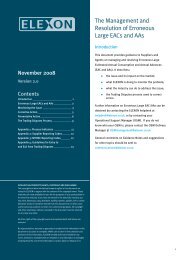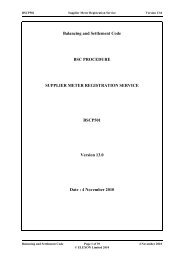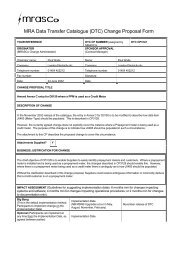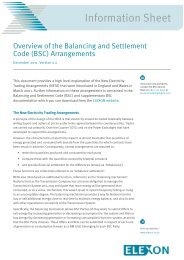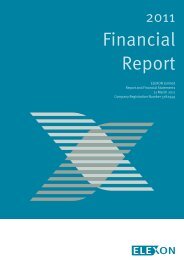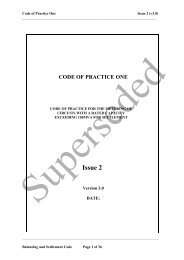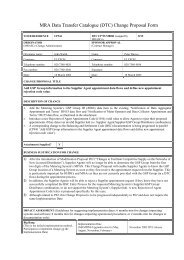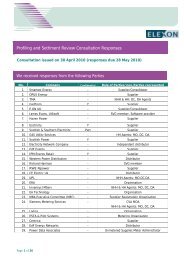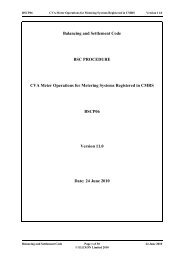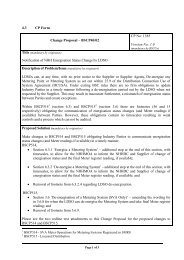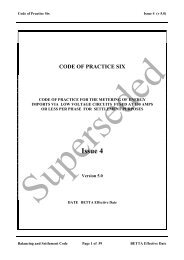BSC Modification P81 - PDF, 37KB - Ofgem
BSC Modification P81 - PDF, 37KB - Ofgem
BSC Modification P81 - PDF, 37KB - Ofgem
You also want an ePaper? Increase the reach of your titles
YUMPU automatically turns print PDFs into web optimized ePapers that Google loves.
Direct Dial: 020 7901 7355The National Grid Company, <strong>BSC</strong> Signatories andOther Interested Parties17 December 2002Our Ref: MP No <strong>P81</strong>Dear Colleague,<strong>Modification</strong> to the Balancing and Settlement Code (“<strong>BSC</strong>”) - Decision and Direction inrelation to <strong>Modification</strong> Proposal <strong>P81</strong>: “Removal of the Requirement for Half Hourly Meteringon Third Party Generators at Domestic Premises”The Gas and Electricity Markets Authority (the “Authority”) 1 has carefully considered the issuesraised in the <strong>Modification</strong> Report 2 in respect of <strong>Modification</strong> Proposal <strong>P81</strong>, “Removal of theRequirement for Half Hourly Metering on Third Party Generators at Domestic Premises”.The Balancing and Settlement Code Panel (the “Panel”) recommended to the Authority that:• Alternative <strong>Modification</strong> Proposal <strong>P81</strong> should be made with an Implementation Date of28 September 2003 if a determination is made by the Authority prior to 1 April 2003;• Proposed <strong>Modification</strong> <strong>P81</strong> should not be made. In the event that the Authoritydetermines that Proposed <strong>Modification</strong> <strong>P81</strong> should be made, the Implementation Dateshould be 28 September 2003 if a determination is made by the Authority prior to 1April 2003; and• the initial value of Small Scale Third Party Generating Plant Limit be set to a maximumtotal Generation capacity of 16 Amperes per phase on a low voltage single (230 Volt) ormulti-phase (400 Volt) supply.The Authority has decided to direct a <strong>Modification</strong> to the <strong>BSC</strong>.1<strong>Ofgem</strong> is the office of the Authority. The terms “<strong>Ofgem</strong>” and “the Authority” are used interchangeably in this letter.2ELEXON document reference <strong>P81</strong>RR, Version No. 1, dated 18 November 2002
This letter explains the background and sets out the Authority’s reasons for its decision. Inaddition, the letter contains a direction to The National Grid Company plc (“NGC”) to modifythe Balancing and Settlement Code (“<strong>BSC</strong>”) in line with Alternative <strong>Modification</strong> Proposal <strong>P81</strong>,as set out in the <strong>Modification</strong> Report.This letter constitutes the notice by the Authority under section 49A Electricity Act 1989 inrelation to the direction.BackgroundTXU UK Ltd. submitted <strong>Modification</strong> Proposal <strong>P81</strong>, “Removal of the Requirement for HalfHourly Metering on Third Party Generators at Domestic Premises” on 3 May 2002. Thejustification for the <strong>Modification</strong> Proposal was that it would better facilitate achievement of theApplicable <strong>BSC</strong> Objective 3 C3 (3) (c), “promoting effective competition in the generation andsupply of electricity, and (so far as consistent therewith) promoting such competition in the saleand purchase of electricity”.The Panel considered the Initial Written Assessment at it meeting of 16 May 2002 and agreed tosubmit <strong>Modification</strong> Proposal <strong>P81</strong> to the Definition Procedure. The <strong>Modification</strong> Group (the“Group”) considered the <strong>Modification</strong> Proposal over the course of two meetings in theDefinition Procedure and three meetings in the Assessment Procedure. The resultantAssessment Report was presented to the Panel at its meeting of 17 October 2002, with therecommendations that the Proposed <strong>Modification</strong> should not be made and that the Alternative<strong>Modification</strong> Proposal should be made with an Implementation Date of 20 January 2004, if apositive determination is made by the Authority prior to 1 April 2003.The <strong>Modification</strong> ProposalCurrently, Section K of the <strong>BSC</strong> states that any Party responsible for any Exports or Imports ofelectricity at a boundary point shall ensure that Metering Equipment is installed that canseparately measure quantities of Import and Export. Section L states that Third Party GeneratingPlant wishing to trade in Supplier Volume Allocation (SVA) must have Half Hourly MeteringEquipment (HHME) installed. Consequently, generation at domestic premises must be meteredon a half-hourly basis if it is to be accounted for in Settlement. Given the likely scale of suchExport from a domestic premise, the cost of HHME would be prohibitive relative to the likelyreward for the Export.3The Applicable <strong>BSC</strong> Objectives, as contained in Condition C3 (3) of National Grid Company’s Transmission Licence, are:a) the efficient discharge by the licensee of the obligations imposed upon it by this licence;b) the efficient, economic and co-ordinated operation by the licensee of the licensee’s transmission system;c) promoting effective competition in the generation and supply of electricity, and (so far as consistent therewith) promoting suchcompetition in the sale and purchase of electricity;d) promoting efficiency in the implementation and administration of the balancing and settlement arrangementse) the undertaking of work by <strong>BSC</strong>Co (as defined in the <strong>BSC</strong>) which is:(i) necessary for the timely and effective implementation of the proposed British Electricity Trading and TransmissionArrangements (BETTA); and(ii) relevant to the proposed GB wide balancing and settlement code;and does not prevent <strong>BSC</strong>Co performing its other functions under the <strong>BSC</strong> in accordance with its objectives.Page 2 of 6
<strong>Modification</strong> Proposal <strong>P81</strong> seeks to relax the current <strong>BSC</strong> requirements so that Exports fromdomestic premises can be taken into account in Settlement without HHME being installed. Itdoes not attempt to alter the requirement for separate metering of Import and Export quantities.The proposer believes that the removal of this cost barrier would facilitate the growth of microgeneration technologies, thereby increasing competition in the generation and supply ofelectricity.In its discussions, the Group considered three main profiling methods that could be used toimplement <strong>Modification</strong> Proposal <strong>P81</strong>; Settlement on existing standard profiles, Settlement usingspecific domestic generation technology profiles and Settlement using demand profiles that havebeen specifically adjusted to incorporate domestic generation characteristics. It was consideredthat the option to settle on the current demand profiles would introduce too much error into theSettlement system. The Group decided against the generation of new load profiles for theSettlement of domestic generation for the following reasons:a. Costb. Lack of suitably robust data with which to generate profilesc. It would require a different profile for each generation technology, thereby leading to aproliferation of load profilesInstead, it proposed to modify the existing demand profiles for domestic customers so as toincorporate the effects of on-site generation over defined time periods during the day (known as“chunking” profiles). It is expected that the Profile Administrator can have these chunkedprofiles ready for use for the major technologies (micro-CHP and Photo Voltaic [PV]) by October2003. This solution is based on the premise that the Profile Administrator can gain access to dataon typical operating times and loads for current gas boilers and generation data for currentlyinstalled PV systems. Additionally, the solution proposes both the addition of four new NHHConsumption Component Classes 4 to allow the Supplier Volume Allocation Agent to provideexplicit reporting of the total volume of Export energy and changes to Market Domain Dataflows so that each Standard Settlement Configuration 5 has an associated Import or Export flag.During the discussions, the Group considered that the use of the term “domestic premises” wastoo general and that it would be better to incorporate some capacity restriction on the ThirdParty Generating Plant that would be entitled to exemption from HHME being installed. Itdecided to adopt the capacity limit being developed by the Distribution Code Review Panel andthe Electrical Safety, Quality and Continuity Regulations 2002, which will come into force on 31January 2003. This limit (the Small Scale Third Party Generating Plant Limit) is set at amaximum total generation capacity of 16 Amperes per phase on a low voltage single (230 Volt)supply or a multi-phase (400 Volt) supply. The legal text allows the Panel the discretion tochange this level without requiring a further <strong>Modification</strong> Proposal, but subject to consultation4A Consumption Component Class is one of a number of categories to which energy values are assigned for reporting purposes bythe Supplier Volume Allocation process5A Standard Settlement Configuration is a set of register switching times for which the Supplier Volume Allocation Agent calculatesprofile coefficients.Page 3 of 6
with Parties and the approval of the Authority. The Alternative Proposal is the same as theoriginal <strong>Modification</strong> Proposal in all other respects.ELEXON published a draft <strong>Modification</strong> Report on 25 October 2002, which invited respondents’views by 1 November 2002.Respondents’ viewsELEXON received ten responses to the consultation on the draft <strong>Modification</strong> Report for<strong>Modification</strong> Proposal <strong>P81</strong>. Six responses (representing 27 Parties) expressed support for theReport’s recommendations (though the support of one of these respondents was conditional),one response (representing 4 Parties) opposed the Report’s recommendations and the remainingthree respondents (representing 4 Parties) did not comment on the Report’s recommendations.Those in favour of the solution being proposed by the Alternative <strong>Modification</strong> Proposalconsidered that it represented a pragmatic and flexible means of facilitating the growth of microgenerationtechnologies, without compromising on the quality of data entering Settlement. Therespondent against the Alternative <strong>Modification</strong> Proposal considered that the cost of theproposed solution was excessive given that it would not be suitable if there were a large numberof micro-generation units entering Settlement. It also commented that it considered thearguments in favour of Applicable Objective C3 (3) (c) as weak and favoured work to subsidiseHH data collection so that a more informed decision may be taken when sufficient quantities ofrobust data have been acquired.Further, one comment was made objecting to the bringing forward of the proposedImplementation Date from 20 January 2004 to 28 September 2003 and two respondents madecomments regarding the Panel being able to change the Small Scale Third Party Generating PlantLimit.The respondents’ views are summarised in the <strong>Modification</strong> Report for <strong>Modification</strong> Proposal<strong>P81</strong>, which also includes the complete text of all respondents’ replies.Panel’s recommendationThe Panel met on 14 November 2002 and considered the <strong>Modification</strong> Proposal <strong>P81</strong>, the draft<strong>Modification</strong> Report, the views of the <strong>Modification</strong> Group and the consultation responsesreceived.The Panel recommended that the Proposed <strong>Modification</strong> should not be made and that theAuthority should approve the Alternative <strong>Modification</strong> Proposal with an Implementation Date of28 September 2003. Moreover, the Panel recommended that the initial value of Small ScaleThird Party Generating Plant Limit should be set to a maximum total Generation capacity of 16Amperes per phase on a low voltage single (230 Volt) or multi-phase (400 Volt) supply.Page 4 of 6
<strong>Ofgem</strong>’s view<strong>Ofgem</strong> considers, having had regard to the Applicable <strong>BSC</strong> Objectives and its statutory duties,that the Alternative proposed modification should be made. <strong>Ofgem</strong> agrees with the <strong>BSC</strong> Panelthat the removal of the requirement for Half Hourly Metering on Third Party Generators in themanner detailed in the Alternative <strong>Modification</strong> Proposal <strong>P81</strong> will better facilitate achievementof the Applicable <strong>BSC</strong> Objectives in that it will introduce a climate more conducive to thegrowth of micro-generation technologies and will promote effective competition in thegeneration and supply of electricity in accordance with Objective C 3 (3) (c).While noting the benefits to competition that may result from the removal of the obligation tohave Half-Hourly Metering in the manner described in the Proposal and its Alternative, <strong>Ofgem</strong> ismindful that such removal should not result in a significant and consequential compromise ofthe integrity of Settlements or otherwise adversely affect the trading arrangements. <strong>Ofgem</strong>acknowledges the concerns of respondents with regard to the costs, the implementation methodand the Settlement implications of any significant uptake in the technology associated with theAlternative Proposal. <strong>Ofgem</strong> also acknowledges that <strong>P81</strong> Alternative may not be the optimalsolution to promoting growth of micro-generation technology but considers that the AlternativeProposal offers the best solution presently available for promoting competition in generation andsupply in this area of the market. Further, on the subject of the metering solutions, <strong>Ofgem</strong> isassured that in accordance with the principles outlined in its March 2002 consultation paper onDistributed generation, that the purport of Alternative Proposal <strong>P81</strong> is not to attempt to alter therequirement for separate metering of Import and Export quantities.<strong>Ofgem</strong> considers that the total maximum generating capacity limit set out in the AlternativeProposal <strong>P81</strong> (16 Amps per phase on a low voltage single supply or a multi-phase supply)provides a more appropriate parameter than that of “domestic premises” set out in the OriginalProposal in that it will limit the size of the Export Energy that could be treated as NHH andwould therefore reduce the amount of error that could be introduced into the Settlementprocess. With regard to the Alternative Proposal, <strong>Ofgem</strong> notes the concerns of respondents atthe manner in which the Panel have arrogated to themselves the power to vary this threshold.<strong>Ofgem</strong> shares these concerns, but in this instance does not consider the Panel’s action to be of anature that warrants rejection of the Proposal. All the same, <strong>Ofgem</strong> considers that generally,aspects of Proposals that may have a significant impact on Parties should be subjected toevaluation by a <strong>Modification</strong> Group.In coming to its conclusion, <strong>Ofgem</strong> also had regard to the guidance issued by the Secretary ofState as to the contribution the Authority can make towards the attainment of the Government’ssocial and environmental policies. Consequently, <strong>Ofgem</strong> considers that the removal of theobligation for Half-Hourly Metering at domestic premises will assist the Government'ssustainable development strategy in that it will remove a cost barrier to the growth of microgenerationtechnologies.<strong>Ofgem</strong> considers it important that appropriate economic incentives exist to reward the efficientuse of generation and demand. Settlement of domestic Export (and indeed domestic Import) byprofiling acts against this principle, in that it doesn’t adequately differentiate between cost andPage 5 of 6
eward levels for different time periods. Nevertheless, <strong>Ofgem</strong> considers that the implementationof <strong>Modification</strong> Proposal <strong>P81</strong> is appropriate for a transitional period of growth for microgeneration,but that it may be necessary to review the arrangements for such Settlement andmetering solutions once the technology has an established base of installations.The Authority’s decisionThe Authority has therefore decided to direct that the Alternative <strong>Modification</strong> Proposal <strong>P81</strong>, asset out in the <strong>Modification</strong> Report for <strong>Modification</strong> Proposal <strong>P81</strong>, should be made andimplemented.Direction under Condition C3 (5) (a) of NGC’s Transmission LicenceHaving regard to the above, the Authority, in accordance with Condition C3 (5) (a) of the licenceto transmit electricity granted to NGC under Section 6 of the Electricity Act 1989 as amended(the “Transmission Licence”), hereby directs NGC to modify the <strong>BSC</strong> as set out in the Alternative<strong>Modification</strong> resulting from the <strong>Modification</strong> Report.The Implementation Date for Alternative <strong>Modification</strong> Proposal <strong>P81</strong> is 28 September 2003.In accordance with Condition C3 (5) (b) of NGC’s Transmission Licence, NGC shall modify the<strong>BSC</strong> in accordance with this direction of the Authority.If you have any questions, please contact me on the above number.Yours sincerely,Nick SimpsonDirector of Industry Code DevelopmentSigned on behalf of the Authority and authorised for that purpose by the AuthorityPage 6 of 6



